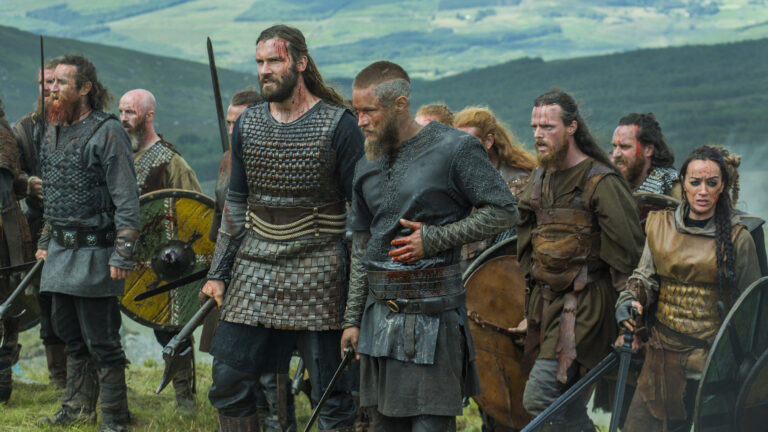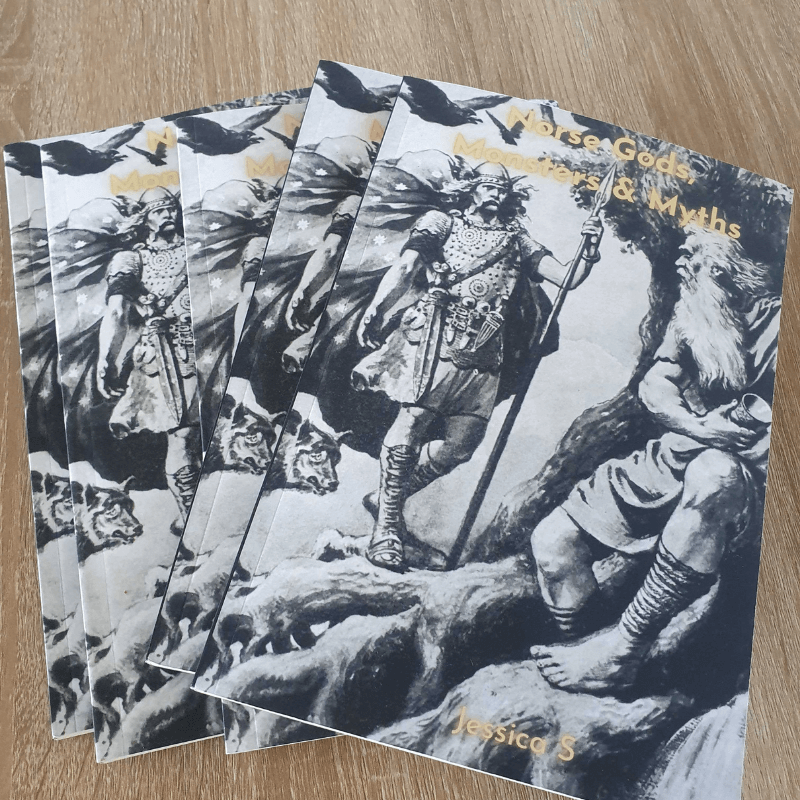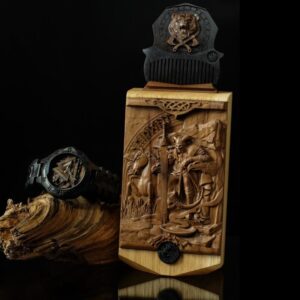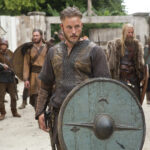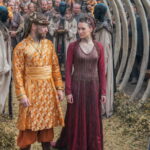We have finally reached season three of the History Channel’s Vikings in our detailed plot recap and historical evaluation.
This marks the final season in which Ragnar Lodbrok is the main protagonist.
Catch up on our previous posts on Season One and Season Two.
Episode 1 “Mercenary”
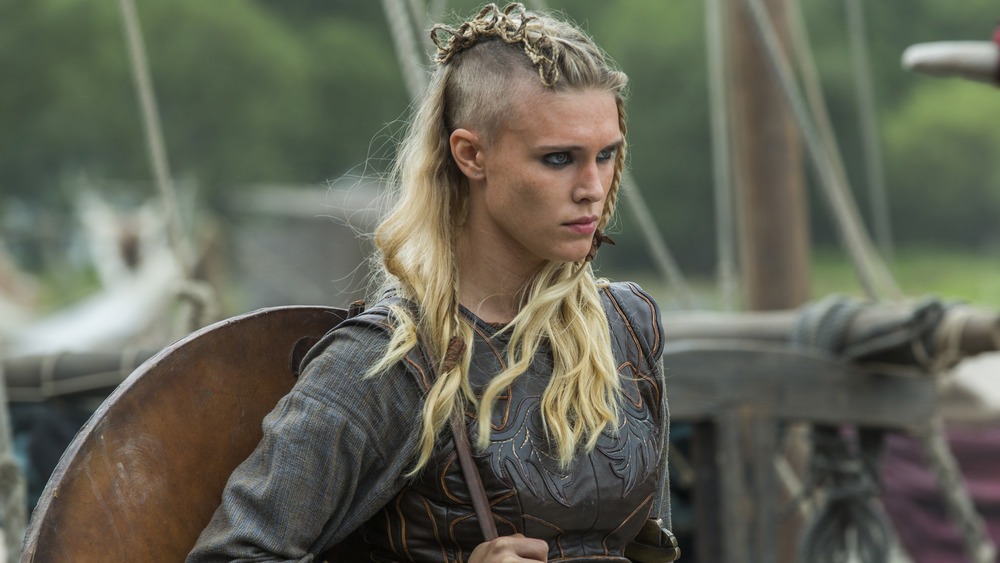
Early in the episode, Ragnar tells his son Bjorn that he never wanted to be a king, and that his main interest in England was to procure farmland for his people.
He therefore prepares to return to England and claim the land in Wessex that King Ecbert had promised.
Lagertha announces that she intends to travel to Wessex with Ragnar, leaving the territory she usurped from her now-dead husband in the hands of her right-hand man, Kalf.
He plots to betray her almost immediately.
This is probably a realistic portrayal of what would happen if a Viking leader left their territory without the strong support of family members to maintain their position.
This is why, in the sagas, there are so many stories of sons of kings returning to reclaim territory from people who had usurped it.
Thorunn decides she wants to be a shieldmaiden like Lagertha and travel to Wessex with Bjorn, much to his disapproval, but he gives in.
While shieldmaidens were relatively rare in the Viking Age, Thorunn is a likely candidate as a former slave with limited status and property.
Becoming a shieldmaiden would have given her a chance to build a life for herself.
When they arrive in Wessex, King Ecbert agrees to restore the land he promised to the Vikings, but on the condition that they fight as mercenaries to help Ecbert gain control of Mercia by winning the throne for the exiled Princess Kwenthrith.
While the Vikings did fight as mercenaries for the English and in other parts of the world, such as the famous Varangians in the Byzantine Empire, this part of the story is set in the early 8th century, and this would not start to happen in England for another 50-100 years.
Lagertha is reluctant to fight as a mercenary, so Ecbert agrees that she can stay behind and lead the Viking settlers as they establish their farms.
As already discussed in Season Two, the Vikings did not make land agreements with the English for at least another 50 years, in around 886 CE, following the mass migration of the Great Heathen Army.
Episode 2 “The Wanderer”
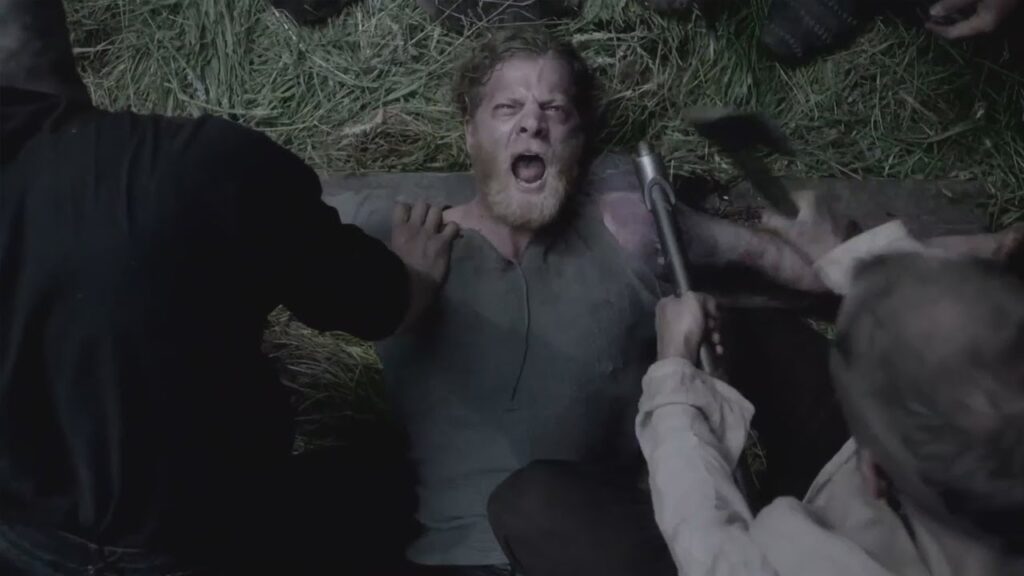
The Vikings successfully take Mercia for Kwenthrith, and we learn that her hatred for her uncle and older brother stems from being sexually abused by them when young.
This also explains her strong sexual appetite, made clear during her time with the Viking army.
The character of Kwenthrith is based on a real historical figure, a princess of Mercia who lived in the 9th century.
The real Kenthrith was the Abbess of several important monasteries and disputed with the Archbishop of Canterbury over control of monasteries.
Prince Aethelwulf searches for Kwenthrith’s younger brother, leaving his wife Judith back in Wessex, where she develops a close relationship with Athelstan.
Meanwhile, Ecbert is wooing Lagertha. Torstein was injured during the fighting, and his arm has become gangrenous, so he asks Floki to amputate it.
Without antibiotics, this was probably a common problem in the Viking world, and amputation would have been the only option to stop the infection from spreading and killing the man.
While some may have preferred to die rather than lose an important limb, dying of illness was not dying on the battlefield, so they would be blocked from entering Valhalla in the afterlife.
Meanwhile, back in Kattegat, Ragnar’s wife Aslaug, Rollo’s wife Siggy, and Floki’s wife Helga all have dreams about a hooded man appearing from the mist with a bloodied hand. At the end of the episode, he appears.
Episode 3 “Warrior’s Fate”
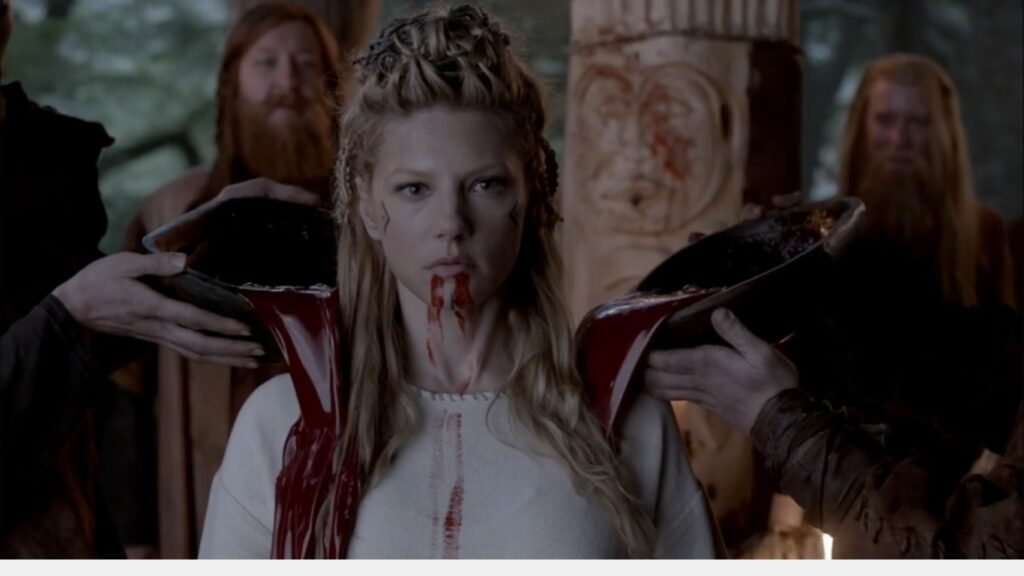
The Vikings track down Kwenthrith’s younger brother and realize they must fight uphill a disadvantageous position – to take him and his army. T
orstein volunteers to go out first and draw the Mercians down the hill, which he does successfully, dying bravely in battle.
The Mercian prince is eventually forced to surrender, kept alive at Kwenthrith’s request.
Thorunn is badly injured in the fighting.
In Wessex, Lagertha leads a Viking ritual to sanctify the new settlement and bring prosperity to the farms. The ritual includes an animal sacrifice.
Witnessed by the local nobles, they are shocked by the ritual and bring up new questions about having pagans in their land.
Back in Kattegat, the mysterious wanderer reveals his name to be Harbard and agrees to share stories of his travels and the gods in exchange for lodgings.
Harbard was one of the names used by Odin when he chose to wander the mortal realm.
When he tells stories of the gods, Helga soon realizes his supernatural nature.
He is also the only one able to calm the baby Ivar in his distress.
Episode 4 “Scarred”
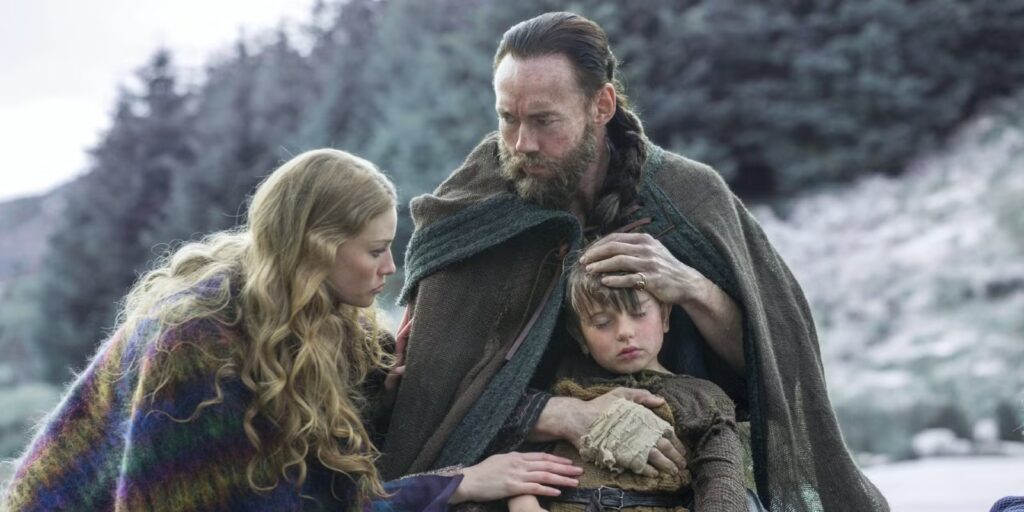
In a sexually charged episode, Lagertha and Ecbert sleep together, and Lagertha tells the king of his selfish nature and that he only thinks of himself.
Athelstan and Judith sleep together and declare their love for one another.
Aslaug and Harbard sleep together before he leaves Kattegat.
When he leaves, he assures her that Ivar’s pain will now be less, suggesting that this may have been the reason for his visit.
It is also an episode full of treachery. Prince Aethelwulf tries to befriend Rollo and Floki, both of whom are unhappy with Ragnar’s leadership.
Kalf calls Erlundur, Jarl Borg’s son, to help him deal with Lagertha when she returns.
He turns up married to Torvi, Borg’s widow, who recently gave birth to Borg’s son.
Kwenthrith, unable to resolve things with her brother, poisons him in front of her court.
She then raises a glass to herself as the sole queen of Mercia.
Those in the room acknowledge her, but then pour their wine on the floor, signaling their disdain for her actions.
In one of the most tragic scenes from the show, Aslaug’s two eldest sons, still young boys, Ubbe and Hvitserk, are lured out onto the ice where they fall into a hole.
Siggy, who was watching them, goes in after them to save them, and the two boys are pulled out by Harbard, but Siggy drowns.
Episode 5 “The Usurper”

There is much heartbreak on the Vikings’ return to Kattegat with the news that Torstein and Siggy are dead. Ragnar is suspicious of why Aslaug was not with her children, and by the end of the episode, he learns about her relationship with Harbard.
Lagertha also learns that Kalf has usurped her kingdom, and asks Ragnar to help.
But rather than fight with her, he convinces them all to come to an agreement and convinces Kalf to join them on their planned raid of Paris the following season.
Floki develops an increasing antipathy for Christianity and Athelstan.
While this episode is set almost 200 years before the Vikings started to convert to Christianity in earnest, he may represent the feelings of many in the times of religious change that followed.
Aethelwulf learns that Judith is pregnant.
In his anger, Athelstan leads a group of nobles into the Viking settlement and kills them all.
Ecbert is angry, but it is soon revealed that this was a plan hatched between the pair of them.
Episode 6 “Born Again”
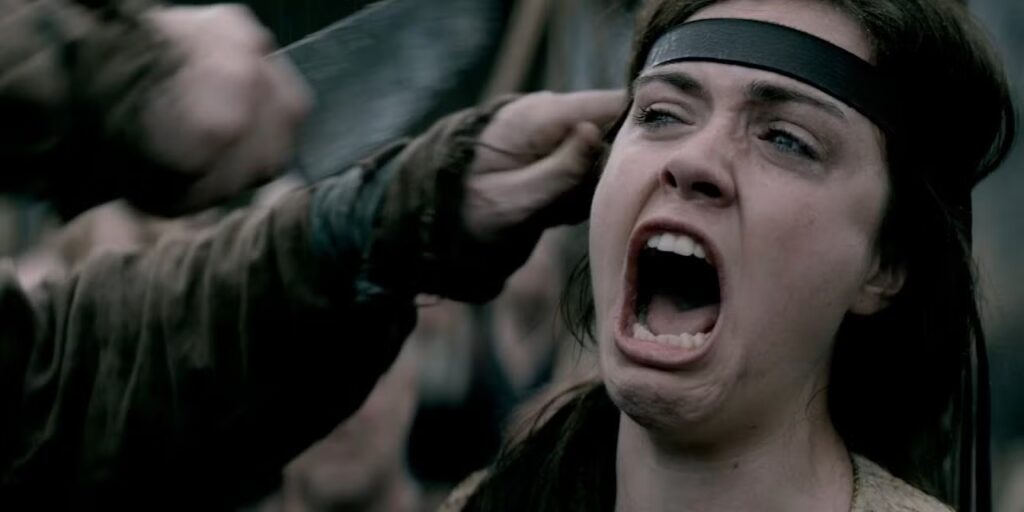
Thorunn, scarred by her injuries and now married to Bjorn, gives birth. Thorunn is in a state of depression due to her injuries and does not want Bjorn to sacrifice himself to be her husband.
Judith gives birth to a son, but is sentenced to have her ears and nose cut off for adultery.
She is tied to a stake and told to reveal the father of her child.
When her first ear is cut off, she reveals it to be Athelstan.
This compels Ecbert to spare her as he believes that Athelstan is some kind of divine messenger and, therefore, that the baby is special.
He convinces Aethelwulf to raise the boy, named Alfred.
This is the future Alfred the Great, whose father was Aethelwulf, and a woman named Osburh, who partially inspired Judith’s character, as explained in our Season Two recap.
Kalf arrives in Kattegat with his ships to join the Paris raid. He is joined by Erlendur, who has married his father’s widow Torvi, but cheats on her publicly.
Torvi then sleeps with Bjorn, who is feeling vulnerable due to his problems with Thorunn.
Marriage alliances were important in the Viking world, so it was not uncommon for a widow to be married to another male member of the same family to maintain the alliance.
Athelstan, who traveled back to Denmark with the Vikings, reveals to Ragnar that he has been born again as a Christian during his time in England, following a sign from God.
This also means that he has removed his Viking arm ring.
When this is discovered by Floki, he decides that Athelstan is a dangerous traitor who must be killed. He sneaks up behind Athelstan and kills him while he is praying.
A grieving Ragnar buries his friend on the side of a mountain.
Episode 7 “Paris”
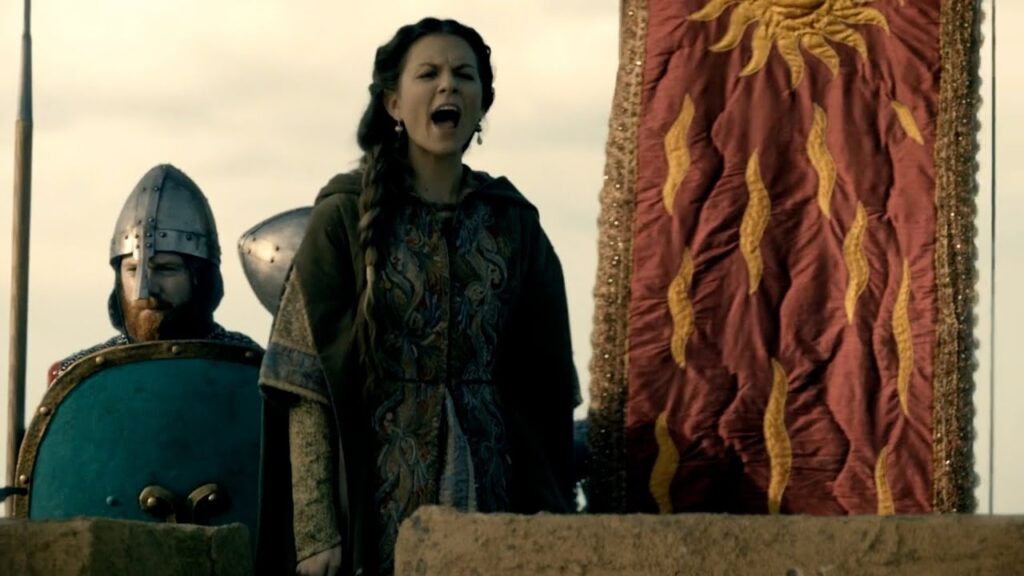
Ragnar and his fleet arrive in Francia and begin raiding, threatening Paris itself.
The powerful Count Odo tries to convince Emperor Charles to evacuate the city, but he is convinced to stay by the faith of his strong-headed daughter Gisla.
The infamous Viking raid on Paris happened in 845, so during the period covered by the show, though the timeline has been condensed.
It was reportedly led by Regnherus, identified as Ragnar Lodbrok.
The French were led by Charles the Bald, though his daughter was Judith of Flanders, who went on to marry Aethelwulf of Wessex and partly inspired the character of Judith.
Meanwhile in Mercia, Kwenthrth kills the Wessex noblemen in her court and breaks wth Ecbert.
The Wessex king sends his son Aethelwulf to Wessex to get her back in line.
He does this by telling her about the massacre of the Viking settlers.
She also informs him that her son, Magnus, is the son of Ragnar.
Episode 8 “To the Gates”
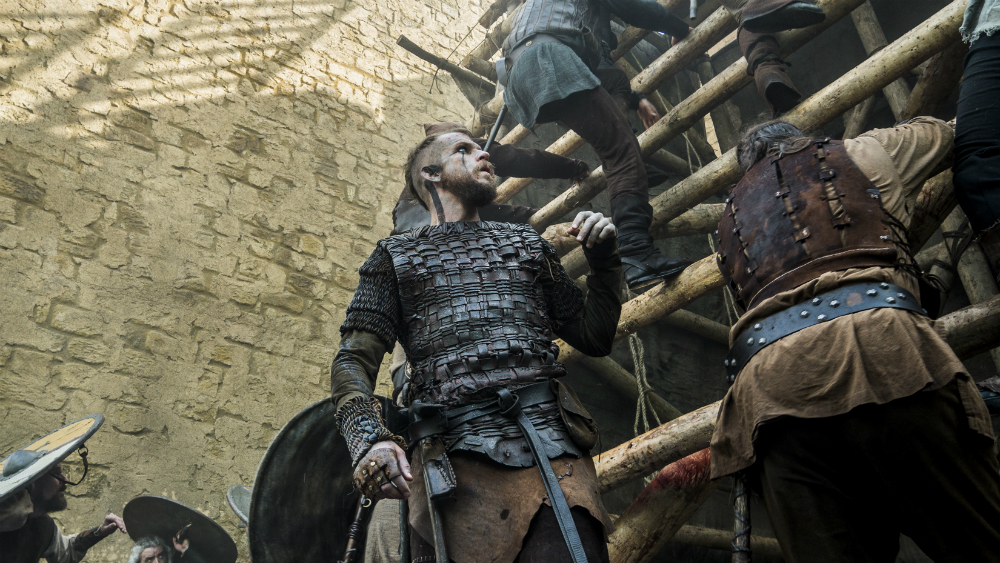
Ragnar surprises everyone by letting Floki lead the attack on Paris.
While Lagertha, Kalf, and Erlendur lead an attack on the city gate, Floki, Ragnar, Bjorn, and Rollo try to breach the walls from boats on the river.
This is an important story element as the French believed that boats could not reach their city, but the shallower Viking boats could pass waters inaccessible to traditional ships.
The French manage to repel the Vikings because Princess Gisla restores their faith by risking her life to fly the Oriflamme, a holy banner of their patron, Saint Denis.
The Vikings return to camp and deal with their injured, including Bjorn, who was thrown off the city walls. Floki is riddled with guilt because he thought that the gods were on his side.
Disgusted with his selfishness, Helga leaves him.
It seems that Ragnar wanted to show him all along that the gods were, in fact, with him, Ragnar.
In the final episode of the season, this will also be linked to Ragnar knowing that it was Floki who killed Athelstan.
The Vikings believed that Odin decided the outcome of all battles, so divine support was important.
Episode 9 “Breaking Point”
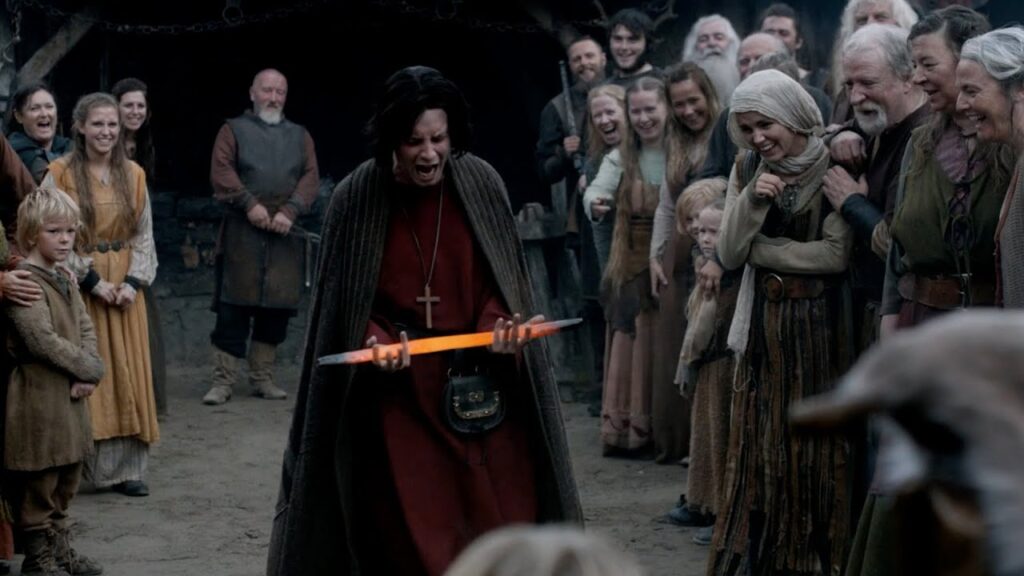
Ragnar now leads a fresh attack on Paris, which is more successful, but they still fail to take the city.
However, plague has broken out in Paris, so Count Odo convinces Charles to come to terms with the Vikings.
Ragnar is also eager to deal, apparently because he has been wounded and his wounds will not heal.
The French offer him silver and gold, but Ragnar does not accept, instead wanting to be baptized and buried inside the city walls.
Back in Kattegat, Aslaug deals with a Christian missionary named Ansgar.
He agrees to prove himself by carrying a hot piece of metal that he believes will not burn him.
When he is overcome with the pain, Aslaug has him killed.
Reports suggest that Christian missionaries often performed “miracles” as part of their work to convert.
Back in Wessex, in Aethelwulf’s absence, Judithth and Ecbert begin having a romantic affair, binding over their love for Athelstan.
Episode 10 “The Dead”
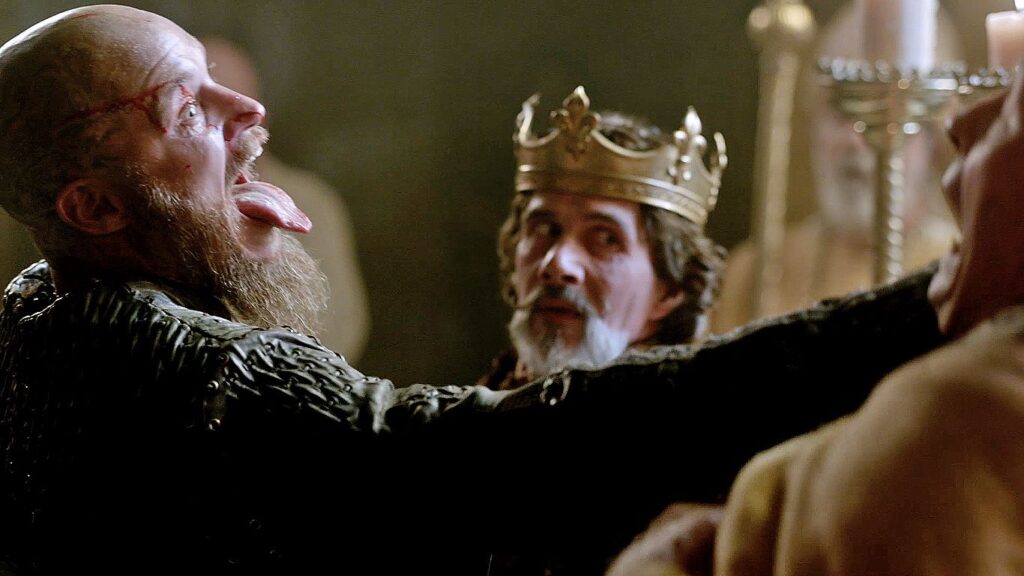
Eventually coming to terms, the French king pays the Vikings to leave. Historically, Charles the Bald paid 7,000 French livres (2,570 kg) in gold and silver.
But before they can leave, Ragnar’s wish to be baptized and buried on holy ground must also be honored, something that shocks most of the Vikings.
Bjorn is in charge while his father is ill and works to fulfill his father’s wishes.
When Ragnar is apparently dead, he is placed in a wooden coffin and escorted to the gates of Paris by a group of warriors.
The coffin is taken into the Cathedral to be blessed, but Ragnar suddenly jumps out of the coffin, alive.
He takes Gisla hostage and forces the guards to open the gates, allowing the Vikings to enter the city.
This is an adaptation of the story of Bjorn Ironside arriving at Luna in Italy, where they reportedly used this tactic to gain access to the city.
The Vikings thought they had arrived at Rome, but when they heard that Rome was even more heavily fortified than Luna, they left Italy without ever reaching the capital.
Their mission accomplished, most of the Vikings set sail for home, but a small party led by Rollo remained behind, camped outside the city to maintain a presence.
Charles, determined to get in front of the problem, offers Rollo land, titles, and his daughter’s hand in marriage much to her objections in exchange for his pledge to defend Paris against future Viking raids.
Hungry for power of his own, Rollow agrees.
This casts Vikings’ Rollo as Rollo the Walker, a Viking who became the Count of Rouen and then the first ruler of Normandy.
While there is no evidence that he was a brother of Ragnar, he is mentioned in the historical sources as participating in a later siege of Paris in 885-886 and securing a Viking foothold in the region.
He took power by making a treaty with Charles the Simple, then king of West Francia, which required him to convert to Christianity and agree to defend the Seine estuary from Viking raids.
Therefore, again, the TV show brings real Viking history forward to condense the action for a more fast-paced show.
In Season Four, we finally meet Ragnar’s other sons as adults.
